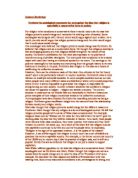It can be argued that for a society to be truly religious, religion must play a part in every aspect of life. This religious ‘Golden Age’ was present in Britain in the Medieval Ages where the Church held most of the power, wealth and status. Today the Church has less wealth and plays little part in the running of the country (there is little Church representation in the Government), Martin (1969) calls this process the disengagement of religion from wider society. However many sociologists would dispute that the ‘Golden Age’ of religion does not automatically indicate an enhanced religious thinking but actually a lack of spiritual freedom which can lessen religious conviction. With an increasingly diverse ethnic mix present in British society there are more religions. Religious pluralism has made people aware that spirituality can be an individual journey and that they are not required to share the same beliefs as everyone else to be religious. This is verification of the idea that institutional religion is in decline but not of secularisation, as although religious beliefs have changed they are still inherently spiritual.
The sociologist Bellah defined religion as the search for the ultimate meaning of life but claimed that this did not have to involve the supernatural. Bellah supported the theory that religious pluralism is evidence against, not for, secularisation saying that religion has become an individual quest as religious doctrine had become less strict. For example today it is impractical for all workers to rest on the Sabbath therefore it is no longer considered unholy to work on a Sunday allowing many to conduct their own worship in their own time. Consequently it is impossible to use research on the Church and other institutional religions as evidence of secularisation. Individuation is the natural evolution of religion whereby religion has not decreased but simply changed to become more personal to the individual. Bellah can be faulted however for his lack of evidence in individuation in wider Western society and also for his definition of religion being too vague
Parsons argued that through generalisation religious teachings have become an integral part of our society. Rather than there being a number of different teachings and values in one society, the institutional religion (in Britain it is Christianity) doctrine has become more generalised and embedded into modern culture. Parsons uses the example of healthcare. When the Church was at its height of power it was responsible for the running of the Hospitals, rather than the State. Religion was a major part of caring for the sick. Today Hospitals are run by the Government but the notion that it the responsibility of the healthy and able to care for the sick is a religious teaching. David Martin looked into generalisation in the US and found the same as Parsons however both have been criticised. It has been said that neither provide enough detailed evidence to support their theory, for example they do not supply evidence that social values do not have a secular foundation rather than religious. Also many argue that it is wrong to assume that Britain and the USA are basically Christian societies. In terms of whether society has become secular Parsons theory of generalisation suggests that this is not the case, religious principals have become embedded in our society.
Weber, another leading sociologist, agreed that many of society’s core social guidelines in modern society have a religious origin. However where Weber significantly differs from Parsons is that he proposes that these guides to action have been transformed into secular guidelines, essentially Weber is arguing for secularisation. Weber uses his study The Protestant Ethic and the Rise of Capitalism to show how the popularity of the Protestant faith has inadvertently caused a secular society. The teaching of the Protestant faith (to work hard and to keep reinvesting time, money and energy so to accumulate wealth) has lead to a decrease in the necessity of religion. Capitalism has brought about an increase in wealth, which provides its own satisfaction and rewards so there is less need for religion. Furthermore new technology and the mechanization of industry has resulted in there being less call for religion as a motivator for hard work. Like generalisation the transformation theory can be condemned for lack of evidence for modern day values having religious origins. Alternatively one could argue that Weber’s theory does not disprove generalisation, he makes little argument for the Protestant Ethic not still being present in society today.
Weber argued against individuation also, claiming that the supernatural belief has been banished from our society and all meanings and motives are governed by rational belief instead. Weber called this Desacrilisation. Wilson developed the argument for desacrilisation citing four reasons for the dissolution of supernatural conviction. Firstly the rise in Protestantism, which Wilson argues encourages rational thought and behaviour. Secondly the rational organisation of society, this can be related to the fact that with a greater equilibrium in society this has lessened ????????????/. Finally the development of rational ideologies such as Communism have highlighted negativity within religious institutions (for example Marx’s claim that ‘Religion is the opium of the people’). Desacrilisation can be denounced for its lack of hard data, it almost appears that much of the theory is based on the impressions of particular researchers. When looking at society from a different perspective it is clear to see that the supernatural does play a significant role in our lives. An example being belief in superstitions such as walking under a ladder or making a wish when you break a wish bone or blow out candles. To imply that supernatural belief has been banished from our society would eradicate all superstitious related actions, yet they are still prevalent in our society.







